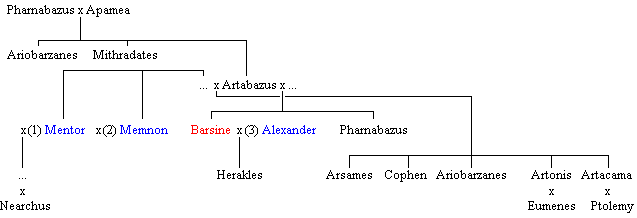Barsine (1)
Barsine (363?-309): Persian princess, member of the Pharnacid dynasty, mistress of the Macedonian king Alexander the Great.

Barsine was probably born in 363 as the eldest daughter of an important Persian nobleman, Artabazus II. She had a full brother Pharnabazus III, who was perhaps a little older. Like his ancestors, Artabazus served as satrap of Hellespontine Phrygia, a province of the Achaemenid empire in the northwest of modern Turkey. Barsine was educated by the best Persian teachers, but she also had Greeks teachers (see quote below).
In 358, her father stood up against the new Persian king Artaxerxes III Ochus. Because the latter still had to establish his rule in Persia proper, Artabazus was first left alone; when the king finally addressed the problem, Artabazus was forced to hire Greek mercenaries. Among these were two Rhodian brothers, Mentor and Memnon. The relation between them and Artabazus was close: in 355, the rebel satrap married their sister and Mentor married to Barsine. He was the first of her three known lovers, but their marriage was not consumed yet, because Barsine was too young.
In the first half of 354, a Persian army suppressed Artabazus' rebellion. With his daughter, his son, his wives and Memnon, the defeated rebel fled to Pella, the capital of Macedonia, where king Philip (360-336) welcomed them and invited them to stay. The exiles met the young crown prince Alexander - seven or eight years younger than Barsine - and may have met the famous philosopher and physician Aristotle of Stagira, who arrived in Pella a few months before they were recalled, in 343.
They owed their recall to Barsine's husband Mentor. After the suppression of Artabazus' revolt, he had fled to the Egyptian king Nectanebo II, but later, he had been able to regain Artaxerxes' favor. In 343, Mentor played an important role in the Persian reconquest of Egypt. When Artaxerxes asked him how he could express his gratitude, the mercenary asked for the recall of Memnon, Artabazus and Barsine. The king pardoned the former rebels (after all, his own relatives too) and received invaluable information about the plans of Philip to attack Persia as soon as he had subdued the Greek cities.
Barsine and her husband met each other again in 342; she was now twenty-one. They did not long enjoy each other's company, because Mentor died two years later. As far as we know, the couple had only one child, a daughter.
Almost immediately after the death of Mentor, she remarried, this time to Memnon, who had already several sons from an earlier marriage. In these years, Memnon lived in the Troad, where he owed land; he expected to be appointed supreme Persian commander in the West, but neither Artaxerxes III, nor Artaxerxes IV Arses (338-336) nor Darius III Codomannus (336-330) dared to give the former rebel this prestigious job.
In 334, the Macedonians invaded the Achaemenid empire, commanded by Alexander, who was now king. Memnon and his sons took part in the defense of Asia, and although the Persians suffered a defeat at the Granicus river, Memnon's qualities were too remarkable, and he was made supreme commander in the West. To keep him loyal, his wife had to stay at the court of king Darius.
Memnon and (after his death in 333) Barsine's brother Pharnabazus achieved remarkable successes in the war against Alexander: with 300 ships, they controlled the Aegean sea, threatened to cut off Alexander's lines of supplies, incited a revolt in Sparta and reached the point where they could bring the war to Macedonia. However, Alexander had moved to the east and had defeated Darius near Issus (November 333). He continued to besiege the city of Tyre, where Pharnabazus' ships came from, and in 332, the Persian fleet disintegrated.
Barsine and Darius' wives had been with Darius when he was defeated at Issus; Alexander's men caught the ladies. The Greek philosopher Plutarch of Chaeronea tells what happened next:
Alexander, esteeming it more kingly to govern himself than to conquer his enemies, sought no intimacy with any one of them, nor indeed with any other women before marriage, except Barsine, Memnon's widow, who was taken prisoner at Damascus. She had been instructed in the Greek learning, was of a gentle temper, and by her father, Artabazus, royally descended, with good qualities, added to the solicitations and encouragement of [Alexander's general] Parmenion, as Aristobulus tells us, made him the more willing to attach himself to so agreeable and illustrious a woman.note
Alexander was Barsine's third lover, and their affair may have been a grown-up continuation of a childhood friendship. However, there may have been political considerations, too: after 330, Alexander wanted to be recognized as king of Persia, and a Persian wife would surely improve the acceptance of his rule. At the same time, Barsine was not too foreign: she spoke Greek, which made her more attractive than other Persian women, who were, in Alexander's opinion, terrible eyesores.note
A few weeks after the death of Darius in the desert east of Rhagae (near modern Tehran), Alexander and his mistress were in Hyrcania, where they received old Artabazus: Barsine's father had always remained loyal to his king but now decided to switch sides.
In 327, after Alexander had finished the pacification of Sogdia, Barsine gave birth to Alexander's first-born child, a son that he called Heracles. Almost immediately, he married to another woman: Roxane. This was tactless, and understandably, Barsine did not remain at Alexander's court. She returned to the west, where she and her son lived in Pergamum. Mentor's daughter was married to Alexander's admiral, Nearchus, in 324.
In 309, Polyperchon, one of the Diadochi who after Alexander's death fought for a share of his empire, tried to restore Heracles to the throne, but he was persuaded by Cassander to give up the attempt. Barsine and Heracles were executed, although it is possible that they had been killed earlier; in that case, the pretender of 309 was a "false Heracles".
